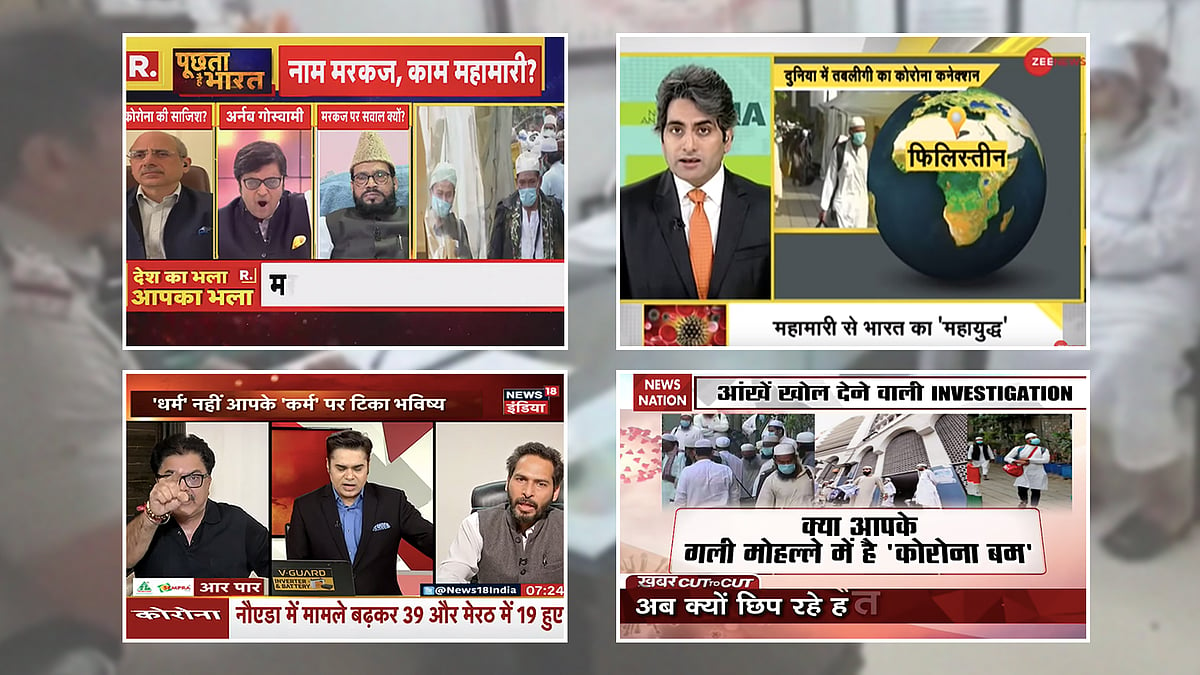German broadcaster partners with Sudhir Chaudhary's WION News, the man who made a 'jihad chart'
When Deutsche Welle associates itself with an Indian channel whose editor peddles bigotry for a living, it’s worth asking why.
Update on April 29:
After talking to Deutsche Welle, Newslaundry clarifies the following: DW has not entered into a partnership with WION. DW is helping a channel discussing the corona situation in Europe. The same was done with other Indian channels as well. The statement by WION on DW's partnership has now been pulled down.
***
Programmes that “respect and safeguard human dignity” and that do not “one-sidedly support a party or political association, religious community”, reporting that is “comprehensive, truthful and factual”, and content that does not “incite hatred against elements of the population”.
Close your eyes and paint a mental picture of a journalist whom you think ticks all those boxes.
Is it this man?

This man, with a fighter jet parked behind him, is Sudhir Chaudhary, editor-in-chief of Zee News, who once plagiarised a “jihad flowchart” to explain concepts such as “love jihad”, “movies and songs jihad”, and “direct jihad”.
Yet, being the editor-in-chief of Zee News isn’t Chaudhary’s only job. He’s also the editor-in-chief and chief executive officer of WION News, a news channel that recently partnered with Deutsche Welle, or DW, Germany’s public international broadcaster.
And DW has stringent guidelines for its programming, content and working principles, including the four principles that this report opens with.
Chaudhary's journalism is problematic, to say the least. Upset by the exit polls predicting the Aam Aadmi Party’s victory in the Delhi Assembly election earlier this year, he shamed the capital’s voters by suggesting they only voted for a party that promised “free stuff” without caring about “national issues”. He slandered students of Jamia Millia Islamia University when the Delhi police teargassed them, and used bogus claims to demonise the citizenship law protests earlier this year. After attendees of a Tablighi Jamaat congregation tested positive for Covid-19, Chaudhary’s primetime segment was replete with anti-Muslim dogwhistling.
The WION statement on its partnership with DW says it’s “aimed at working locally in our target regions and to endure that our content caters to our audience's interests and demands. Through this partnership, DW correspondents will bring ground reports and in-depth analysis for our viewers”.
One of the first reports to emerge from this partnership was an April 24 report on divisions between European Union leaders over economic relief packages.
Notwithstanding its occasional forays into hyperbole, WION is a rather respectable news channel. It was launched by the Zee Media Corporation in 2016. The following year, its then editor-in-chief, Rohit Gandhi, who was part of the founding team, quit and Chaudhary took over.
Chaudhary himself doesn’t host a regular show on WION, though he occasionally pops up in its reports.
In March, Chaudhary described WION as a “credible and respected voice, not just in India but across the world”, citing the example of American president Donald Trump “watching and retweeting WION stories” before Trump’s visit to India.
“The media now works for powerful people,” Chaudhary continued, speaking at the WION Global Summit in Dubai. “They cater to vested interests, directly or indirectly, pushing someone’s agenda...They keep complaining about this credibility, this crisis, but do nothing to address it.” He suggested that WION was working towards finding a “solution” to this “crisis of credibility.”
If anything, this only highlights the duality of Zee’s news offerings. There’s WION promising to solve the issues of “vested interests” and agenda-driven journalism. Then, there’s Zee News, a channel that mischievously aired video footage to make it seem as though students shouted “Pakistan Zindabad” on the Jawaharlal Nehru University campus in 2016. (Spoiler alert: they didn’t.)
What is DW?
DW is Germany’s public international broadcaster, similar to the United Kingdom’s BBC World Service and Japan’s NHK World. It is organised under public law and is funded by the taxpayer.
In November 2019, DW announced its intention to strategically expand in India, with plans to establish a Delhi bureau and “negotiate and sign agreements with private and state-run broadcasters”. In 2018, it partnered with the newsite Scroll for Eco India, a weekly programme on environment and sustainability that celebrated its first anniversary last November.
Interestingly, DW has its own set of detractors, especially among Indian viewers.
On April 17, DW published an interview with the writer Arundhati Roy, who said the situation in India was “approaching genocidal”.
“India’s Muslims are facing a wave of violence and hatred,” the channel quoted Roy as saying. “Since this government came, Muslims have been lynched, Muslims have been hunted down.”
Most of the replies to the tweet exemplify the wave of outrage from the Hindu nationalist camp. The anger was compounded by the fact that DW chose to hide some of the responses.
DW has also been critical of Indian policy. In October 2019, a piece by one of its journalists said: “Germany wants nothing more than to be a close partner to Modi as he builds his ‘new India’. The problem is, there are a number of grave human rights abuses and democratic deficiencies in the self-named ‘largest democracy on earth’.”
The German broadcaster’s partnership might be with a saner avatar of Chaudhary’s journalism, a TV channel that has a reputation for level-headed reporting. Yet, it’s still headed by Chaudhary, whose “journalism” is on full display at 9 pm every night on WION’s sister concern, Zee News.
This brings us back to the duality of India’s Big Media. News channels under the same company often offer contrasting fares, serving distinctly different market interests. Case in point is Times Now and Mirror Now; Faye D’souza, Mirror Now’s former executive editor, served as a liberal foil to the Hindu nationalist rhetoric from Times Now’s Rahul Shivshankar and Navika Kumar.
Or the Ananda Bazar Patrika Group, which runs the Telegraph, famous for its pithy headlines lambasting the governing Bharatiya Janata Party, and ABP News, which invented research in April to praise Prime Minister Narendra Modi.
When the taxpayer-funded Deutsche Welle associates itself with an Indian channel whose editor peddles bigotry for a living, it’s worth asking why.
 Coronavirus and Nizamuddin: TV news returns to bigotry with a bang
Coronavirus and Nizamuddin: TV news returns to bigotry with a bang
 Bloodlust TV: Sudhir Chaudhary’s campaign of hate, powered by Sensodyne
Bloodlust TV: Sudhir Chaudhary’s campaign of hate, powered by Sensodyne
